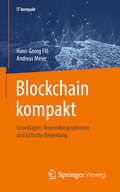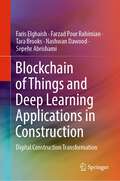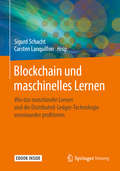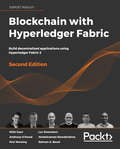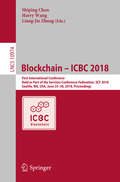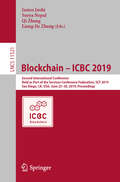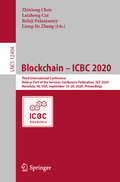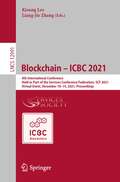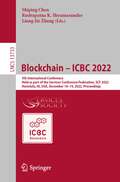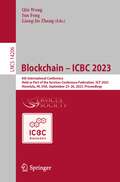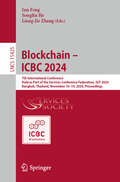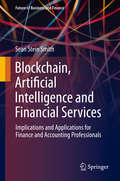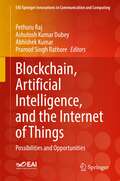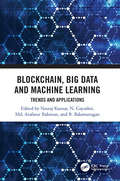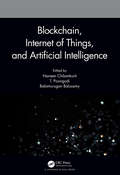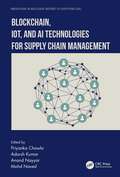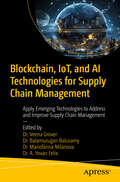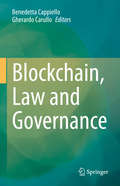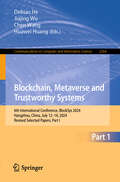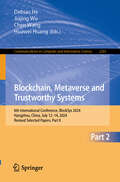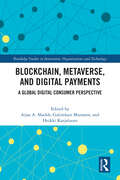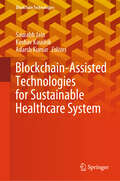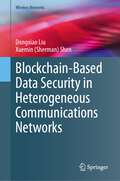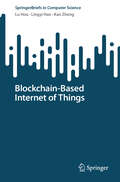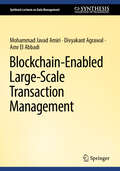- Table View
- List View
Blockchain kompakt: Grundlagen, Anwendungsoptionen und kritische Bewertung (IT kompakt)
by Andreas Meier Hans-Georg FillLernen Sie in diesem Fachbuch mehr über die Grundlagen von BlockchainSie interessieren sich für Kryptowährungen durch Blockchain-Technologie? Aber irgendwie erscheint Ihnen die Thematik wie ein Buch mit sieben Siegeln? Dieses Fachbuch von Hans-Georg Fill und Andreas Meier liefert Ihnen einen Überblick rund um Blockchain. Es erläutert detailliert und übersichtlich die Grundlagen zu folgenden Themenfeldern:Datenstrukturen wie Hash-Funktionen und -BäumeDigitale SignaturFunktionenKonsensalgorithmenetc.Blockchains sind jedoch nicht nur ein Teil von Kryptowährungen. Es handelt sich um ein digitales Buchungssystem. Die Technologie von Ethereum ist daher für viele Unternehmen äußerst interessant (Stichwort Smart Contracts, Smart Grid, Smart Cities). Das Fachbuch über Blockchain ist somit genau das Richtige für Sie, wenn Sie Verbesserungen im eigenen Unternehmen, der Verwaltung oder im öffentlichen Leben vornehmen oder alternative Lösungen angehen wollen.Konzepte und Anwendungen der KryptographieIn den sechs Kapiteln des Fachbuches über Blockchain liefern Ihnen die Autoren Antworten auf verschiedene rechtliche Fragen. Sie befassen sich im Rahmen ihrer Ausführungen kritisch mit der Blockchain-Technologie und zeigen Ihnen wichtige Anwendungsoptionen. Sie erhalten einen fundierten Überblick über folgende Themenfelder:Motivation Betrugsprävention Grundlagen zur Blockchain-Technologie Aufbau und Funktion der BlockchainAnwendungsoptionen Rechtliche FragenKritische EinschätzungDieses Fachbuch über Blockchain richtet sich an Führungsverantwortliche, Projektleiter und Interessierte, die sich einen Überblick über das Potenzial der Blockchain-Technologie verschaffen möchten.
Blockchain of Things and Deep Learning Applications in Construction: Digital Construction Transformation
by Farzad Pour Rahimian Sepehr Abrishami Faris Elghaish Tara Brooks Nashwan DawoodThis book significantly contributes the digital transformation of construction. The book explores the capabilities of deep learning to provide smart solutions for the construction industry, particularly in areas of managing equipment, design optimization, energy optimization and detect cracks for buildings and highways. It provides conceptual solutions but also practical techniques. A new deep learning CNN-based highway cracks detection is demonstrated, and its usefulness is tested. The resulting deep learning CNN model will enable users to scan long distance of highway and detect types of cracks accurately in a very short time compared to traditional approaches.The book explores the integration of IoT and blockchain to provide practical solutions to tackle existing challenges like the endemic fragmentation in supply chain, the need for monitoring construction projects remotely and tracking equipment on the site. The Blockchain of Things (BCoT) concept has been introduced to exploit the advantages of IoT and blockchain, and different applications were developed based on this integration in leading industries such as shared economy and health care. Workable potential use cases to exploit successful utilization of BCoT for the construction industry are explored in the book’s chapters.This book will appeal to researchers in providing a comprehensive review of related literature on blockchain, the IoT and construction identify gaps and offer a springboard for future research. Construction practitioners, research and development institutes and policy makers will also benefit from its usefulness as a reference book and collection of case studies on the application of these new approaches in construction.
Blockchain und maschinelles Lernen: Wie das maschinelle Lernen und die Distributed-Ledger-Technologie voneinander profitieren
by Sigurd Schacht Carsten LanquillonDurch Bitcoin wurde die Blockchain als zugrundeliegende Technologie bekannt. Sie zählt zu den Distributed-Ledger-Technologien, die zukünftig viele Bereiche des wirtschaftlichen Handels beeinflussen werden. So bergen dezentrale autonome Anwendungen enormes Potenzial, nicht nur Prozesse, sondern auch Vertragsabstimmungen zu automatisieren. Beispielsweise kann ein automatisiertes wirtschaftliches Handeln zwischen Maschinen ermöglicht werden. Um einen derart hohen Automatisierungsgrad zu erreichen, müssen datenbasierte Entscheidungen autonom – ohne menschliches Zutun – getroffen werden. Maschinelle Lernverfahren können dabei eine zentrale Komponente bei der Entscheidungsfindung einnehmen. Das Buch stellt erstmalig die komplementären Themengebiete Distributed-Ledger-Technologie und maschinelles Lernen gegenüber und zeigt auf, welches Potenzial freigesetzt werden kann, wenn beide Technologien zielführend miteinander verbunden werden. Das Buch ist eine unverzichtbare Lektüre für diejenigen, die sich tiefgreifendes Wissen in der Kombination beider Themengebiete aufbauen wollen, indem einerseits die theoretischen Grundlagen und andererseits auch mögliche Anwendungsszenarien dargestellt werden.
Blockchain with Hyperledger Fabric: Build decentralized applications using Hyperledger Fabric 2, 2nd Edition
by Luc Desrosiers Nitin Gaur Petr Novotny Venkatraman Ramakrishna Anthony O'DowdLearn to develop blockchain-based distributed ledgers and deploy a Hyperledger Fabric network with concrete exercises and examplesKey FeaturesUpdated with the latest features and additions that come with Hyperledger Fabric 2Write your own smart contracts and services using Java and JavaScript on a Hyperledger Fabric networkDive into real-world blockchain challenges such as integration and scalabilityBook DescriptionBlockchain with Hyperledger Fabric - Second Edition is a refreshed and extended version of the successful book on practical Hyperledger Fabric blockchain development. This edition includes many new chapters, alongside comprehensive updates and additions to the existing ones. Entirely reworked for Hyperledger Fabric version 2, this edition will bring you right up to date with the latest in blockchain. Using a real-world Trade Finance and Logistics example, with working code available on GitHub, you'll really understand both how and why Hyperledger Fabric can be used to maximum effect. This book is your comprehensive guide and reference to explore and build blockchain networks using Hyperledger Fabric version 2. This edition of the book begins by outlining the evolution of blockchain, including an overview of relevant blockchain technologies. Starting from first principles, you'll learn how to design and operate a permissioned blockchain network based on Hyperledger Fabric version 2. You will learn how to configure the main architectural components of a permissioned blockchain network including Peers, Orderers, Certificate Authorities, Channels, and Policies. You'll then learn how to design, develop, package, and deploy smart contracts, and how they are subsequently used by applications. This edition also contains chapters on DevOps, blockchain governance, and security, making this your go-to book for Hyperledger Fabric version 2.What you will learnDiscover why blockchain is a technology and business game changerSet up blockchain networks using Hyperledger Fabric version 2Understand how to create decentralized applicationsLearn how to integrate blockchains with existing systemsWrite smart contracts and services quickly with Hyperledger Fabric and Visual Studio CodeDesign transaction models and smart contracts with Java, JavaScript, TypeScript, and GolangDeploy REST gateways to access smart contracts and understand how wallets maintain user identities for access controlMaintain, monitor, and govern your blockchain solutionsWho this book is forThis book is designed in such a way that professionals from different areas including business leaders, technology leaders, blockchain application developers, and even beginners can benefit from it.
Blockchain – ICBC 2018: First International Conference, Held as Part of the Services Conference Federation, SCF 2018, Seattle, WA, USA, June 25-30, 2018, Proceedings (Lecture Notes in Computer Science #10974)
by Liang-Jie Zhang Shiping Chen Harry WangThis book constitutes the refereed proceedings of the First International Conference on Blockchain, ICBC 2018, held as part of the Services Conference Federation, SCF 2018, in Seattle, USA, in June 2018. The 16 full papers and 7 short papers presented were carefully reviewed and selected from 36 submissions. The papers cover a wide range of topics in blockchain technologies, platforms, solutions and business models such as new blockchain architecture, platform constructions, blockchain development and blockchain services technologies as well as standards, and blockchain services innovation lifecycle including enterprise modeling, business consulting, solution creation, services orchestration, services optimization, services management, services marketing, business process integration and management.
Blockchain – ICBC 2019: Second International Conference, Held as Part of the Services Conference Federation, SCF 2019, San Diego, CA, USA, June 25–30, 2019, Proceedings (Lecture Notes in Computer Science #11521)
by Qi Zhang Surya Nepal Liang-Jie Zhang James JoshiThis book constitutes the refereed proceedings of the Second International Conference on Blockchain, ICBC 2019, held as part of the Services Conference Federation, SCF 2019, in San Diego, CA, USA, in June 2019. The 13 full papers and 2 short papers presented were carefully reviewed and selected from 29 submissions. The papers cover a wide range of topics in blockchain technologies, platforms, solutions and business models such as new blockchain architecture, platform constructions, blockchain development and blockchain services technologies, as well as standards, and blockchain services innovation lifecycle including enterprise modeling, business consulting, solution creation, services orchestration, services optimization, services management, services marketing, business process integration and management.
Blockchain – ICBC 2020: Third International Conference, Held as Part of the Services Conference Federation, SCF 2020, Honolulu, HI, USA, September 18-20, 2020, Proceedings (Lecture Notes in Computer Science #12404)
by Liang-Jie Zhang Balaji Palanisamy Zhixiong Chen Laizhong CuiThis book constitutes the proceedings of the Third International Conference on Blockchain, ICBC 2020, held as part of SCF 2020, during September 18-20, 2020. The conference was planned to take place in Honolulu, HI, USA and was changed to a virtual format due to the COVID-19 pandemic. The 14 full paper and 1 short paper presented were carefully reviewed and selected from 26 submissions. They deal with all topics regarding blockchain technologies, platforms, solutions and business models, including new blockchain architecture, platform constructions, blockchain development and blockchain services technologies as well as standards, and blockchain services innovation lifecycle including enterprise modeling, business consulting, solution creation, services orchestration, services optimization, services management, services marketing, business process integration and management.
Blockchain – ICBC 2021: 4th International Conference, Held as Part of the Services Conference Federation, SCF 2021, Virtual Event, December 10–14, 2021, Proceedings (Lecture Notes in Computer Science #12991)
by Liang-Jie Zhang Kisung LeeThis book constitutes the proceedings of the 4th International Conference on Blockchain, ICBC 2021, held as part of SCF 2021, held as a Virtual Event, during December 10–14, 2021. The 8 full papers and 1 short paper presented were carefully reviewed and selected from 31 submissions. They deal with all topics regarding blockchain technologies, platforms, solutions and business models, including new blockchain architecture, platform constructions, blockchain development and blockchain services technologies as well as standards, and blockchain services innovation lifecycle including enterprise modeling, business consulting, solution creation, services orchestration, services optimization, services management, services marketing, business process integration and management.
Blockchain – ICBC 2022: 5th International Conference, Held as part of the Services Conference Federation, SCF 2022, Honolulu, HI, USA, December 10–14, 2022, Proceedings (Lecture Notes in Computer Science #13733)
by Rudrapatna K. Shyamasundar Liang-Jie Zhang Shiping ChenThis book constitutes the proceedings of the 5th International Conference on Blockchain, ICBC 2022, held as part of the Services Conference Federation, SCF 2022, held in Honolulu, HI, USA, in December 2022. The 8 full papers and 1 short paper presented in this volume were carefully reviewed and selected from 22 submissions.The International Conference on Blockchain (ICBC) aims to provide an international forum for both researchers and industry practitioners to exchange the latest fundamental advances in the state-of-the-art technologies and best practices of blockchain, as well as emerging standards and research topics which would define the future of blockchain.
Blockchain – ICBC 2023: 6th International Conference, Held as Part of the Services Conference Federation, SCF 2023, Honolulu, HI, USA, September 23–26, 2023, Proceedings (Lecture Notes in Computer Science #14206)
by Qin Wang Jun Feng Liang-Jie ZhangThis book constitutes the proceedings of the 6th International Conference on Blockchain, ICBC 2023, held as part of the Services Conference Federation, SCF 2023, held in Honolulu, HI, USA, during September 23–26, 2023. The 9 full papers presented in this book were carefully reviewed and selected from 18 submissions. The conference focuses on new blockchain architecture, platform constructions, blockchain development, and blockchain services technologies as well as standards and blockchain services innovation lifecycle, including enterprise modeling, business consulting, solution creation, services orchestration, services optimization, services management, services marketing, and business process integration and management.
Blockchain – ICBC 2024: 7th International Conference, Held as Part of the Services Conference Federation, SCF 2024, Bangkok, Thailand, November 16-19, 2024, Proceedings (Lecture Notes in Computer Science #15425)
by Jun Feng Liang-Jie Zhang Songlin HeThis book constitutes the proceedings of the 7th International Conference on Blockchain – ICBC 2024, held as part of the Services Conference Federation, SCF 2024, held in Bangkok, Thailand, during November 16–19, 2024. The 9 full papers included in this book were carefully reviewed and selected from 20 submissions. These papers discussed the latest fundamental advances in the state-of-the-art technologies and best practices of blockchain, as well as emerging standards and research topics which would define the future of blockchain.
Blockchain, Artificial Intelligence and Financial Services: Implications and Applications for Finance and Accounting Professionals (Future of Business and Finance)
by Sean Stein SmithBlockchain technology and artificial intelligence (AI) have the potential to transform how the accounting and financial services industries engage with the business, stakeholder and consumer communities. Presenting a blend of technical analysis with current and future applications, this book provides professionals with an action plan to embrace and move forward with these new technologies in financial and accounting organizations. It is written in a conversational style that is unbiased and objective, replacing jargon and technical details with real world case examples.
Blockchain, Artificial Intelligence, and the Internet of Things: Possibilities and Opportunities (EAI/Springer Innovations in Communication and Computing)
by Pethuru Raj Abhishek Kumar Ashutosh Kumar Dubey Pramod Singh RathoreThis book provides basic concepts and deep knowledge about various security mechanisms that can be implemented in IoT through Blockchain technology. This book aids readers in gaining insight and knowledge about providing security and solutions to different challenges in IoT using Blockchain technology. This book primarily focuses on challenges to addressing the integration of the IoT with Blockchain with respect to potential benefits for IoT. This book gives descriptive analysis of Blockchain integrated with IoT applications and platforms for the development of IoT solutions along with possible topologies to that integration. Several application examples are included in a variety of industries.
Blockchain, Big Data and Machine Learning: Trends and Applications
by Neeraj Kumar; N. Gayathri; Md. Arafatur Rahman; B. BalamuruganPresent book covers new paradigms in Blockchain, Big Data and Machine Learning concepts including applications and case studies. It explains dead fusion in realizing the privacy and security of blockchain based data analytic environment. Recent research of security based on big data, blockchain and machine learning has been explained through actual work by practitioners and researchers, including their technical evaluation and comparison with existing technologies. The theoretical background and experimental case studies related to real-time environment are covered as well. Aimed at Senior undergraduate students, researchers and professionals in computer science and engineering and electrical engineering, this book: Converges Blockchain, Big Data and Machine learning in one volume. Connects Blockchain technologies with the data centric applications such Big data and E-Health. Easy to understand examples on how to create your own blockchain supported by case studies of blockchain in different industries. Covers big data analytics examples using R. Includes lllustrative examples in python for blockchain creation.
Blockchain, Internet of Things, and Artificial Intelligence
by Naveen Chilamkurti Balamurugan Balusamy T. PoongodiBlockchain, Internet of Things, and Artificial Intelligence provides an integrated overview and technical description of the fundamental concepts of blockchain, IoT, and AI technologies. State-of-the-art techniques are explored in depth to discuss the challenges in each domain. The convergence of these revolutionized technologies has leveraged several areas that receive attention from academicians and industry professionals, which in turn promotes the book's accessibility more extensively. Discussions about an integrated perspective on the influence of blockchain, IoT, and AI for smart cities, healthcare, and other business sectors illuminate the benefits and opportunities in the ecosystems worldwide. The contributors have focused on real-world examples and applications and highlighted the significance of the strengths of blockchain to transform the readers’ thinking toward finding potential solutions. The faster maturity and stability of blockchain is the key differentiator in artificial intelligence and the Internet of Things. This book discusses their potent combination in realizing intelligent systems, services, and environments. The contributors present their technical evaluations and comparisons with existing technologies. Theoretical explanations and experimental case studies related to real-time scenarios are also discussed. FEATURES Discusses the potential of blockchain to significantly increase data while boosting accuracy and integrity in IoT-generated data and AI-processed information Elucidates definitions, concepts, theories, and assumptions involved in smart contracts and distributed ledgers related to IoT systems and AI approaches Offers real-world uses of blockchain technologies in different IoT systems and further studies its influence in supply chains and logistics, the automotive industry, smart homes, the pharmaceutical industry, agriculture, and other areas Presents readers with ways of employing blockchain in IoT and AI, helping them to understand what they can and cannot do with blockchain Provides readers with an awareness of how industry can avoid some of the pitfalls of traditional data-sharing strategies This book is suitable for graduates, academics, researchers, IT professionals, and industry experts.
Blockchain, IoT, and AI Technologies for Supply Chain Management (Innovations in Intelligent Internet of Everything (IoE))
by Anand Nayyar Adarsh Kumar Mohd Naved Priyanka ChawlaSupply chain management, often known as SCM, refers to the extensive variety of operations that are required to plan, monitor, and coordinate the movement of a product from its raw materials to its finished state in the most time- and money-efficient manner possible. How the supply chain is managed has an impact not only on the quality of the product and the service but also on the distribution, costs, and overall customer experience. Supply chain management is a massive undertaking that needs firms to reevaluate the method in which they operate their supply chains. Blockchain, IoT, and AI Technologies for Supply Chain Management discusses the problems and difficulties that the facilitators of the supply chain confront, in addition to the possible solutions to such problems and difficulties. This book will be the only one of its kind to address the impact of COVID-19 on supply chain systems involving different stakeholders such as producers, dealers, and manufacturers and will provide a foundation for future research opportunities that will allow for the unrestricted expansion and prosperity of business. It will serve as a foundation for academics, scientists, and educationists interested in the use of modern technologies in the field of supply chain management, such as the Internet of Things (IoT), Artificial Intelligence (AI), and Blockchain. In addition to those engaged in research, undergraduate and postgraduate students in higher education can also use this publication as a reference book. This book also presents a multifaceted perspective for the general public, including topics such as computer science, the food business, hotel management, fashion, medical, inventory management, and agricultural spheres.
Blockchain, IoT, and AI Technologies for Supply Chain Management: Apply Emerging Technologies to Address and Improve Supply Chain Management
by Mariofanna Milanova Veena Grover B. Balamurugan Balusamy A. Yovan FelixExamine the synergistic possibilities of combining blockchain, IoT, and AI technologies in supply chain management. This book will address the difficulties and possibilities of integrating these technologies and offer helpful implementation advice. The current state of supply chain management involves several challenges, including lack of transparency, limited visibility into product movements, inefficient inventory management, and difficulty in tracking and tracing products. Blockchain, IoT, and AI can potentially address some of these challenges and improve supply chain management. To help illustrate this, case studies and actual instances of businesses implementing or experimenting with blockchain, IoT, and AI technology in their supply chains are included in the book. You’ll review helpful advice on implementation and highlight successful deployments, lessons learned, and the impact of these technologies on supply chain visibility, agility, sustainability, and customer experience. This book further elaborates the fundamental concepts of AI and ML algorithms and demonstrates how AI can process enormous volumes of supply chain data to produce actionable insights, improve inventory control, forecast demand, and increase forecasting precision. This collective work will serve as a comprehensive guide for supply chain professionals, researchers, and technology enthusiasts interested in understanding the potential of blockchain, IoT, and AI technologies in revolutionizing supply chain management practices. What You Will Learn Discuss the evolving landscape of technology, potential advancements, and how Blockchain, IoT, and AI can shape the future of supply chainsGain Insight into upcoming developments and prepare for changing dynamics of the industryUnderstand intricate details of blockchain, IoT, and AI Technologies in real-life scenarios Who Is This Book For Industry Professionals working in the domain of supply chain management who would be interested in understanding how these technologies can enhance efficiency, transparency, and optimization in their supply chains.
Blockchain, Law and Governance
by Benedetta Cappiello Gherardo CarulloThis volume explores from a legal perspective, how blockchain works. Perhaps more than ever before, this new technology requires us to take a multidisciplinary approach. The contributing authors, which include distinguished academics, public officials from important national authorities, and market operators, discuss and demonstrate how this technology can be a driver of innovation and yield positive effects in our societies, legal systems and economic/financial system. In particular, they present critical analyses of the potential benefits and legal risks of distributed ledger technology, while also assessing the opportunities offered by blockchain, and possible modes of regulating it. Accordingly, the discussions chiefly focus on the law and governance of blockchain, and thus on the paradigm shift that this technology can bring about.
Blockchain, Metaverse and Trustworthy Systems: 6th International Conference, BlockSys 2024, Hangzhou, China, July 12–14, 2024, Revised Selected Papers, Part I (Communications in Computer and Information Science #2264)
by Chen Wang Jiajing Wu Debiao He Huawei HuangThis two-volume set CCIS 2264 and CCIS 2265 constitutes the refereed proceedings of the 6th International Conference on Blockchain and Trustworthy Systems, BlockSys 2024, held in Hangzhou, China, during July 12–14, 2024. The 34 full papers presented in these two volumes were carefully reviewed and selected from 74 submissions. The papers are organized in the following topical sections: Part I: Blockchain and Data Mining; Data Security and Anomaly Detection; Blockchain Performance Optimization. Part II: Frontier Technology Integration; Trustworthy System and Cryptocurrencies; Blockchain Applications.
Blockchain, Metaverse and Trustworthy Systems: 6th International Conference, BlockSys 2024, Hangzhou, China, July 12–14, 2024, Revised Selected Papers, Part II (Communications in Computer and Information Science #2265)
by Chen Wang Jiajing Wu Debiao He Huawei HuangThis two-volume set CCIS 2264 and CCIS 2265 constitutes the refereed proceedings of the 6th International Conference on Blockchain and Trustworthy Systems, BlockSys 2024, held in Hangzhou, China, during July 12–14, 2024. The 34 full papers presented in these two volumes were carefully reviewed and selected from 74 submissions. The papers are organized in the following topical sections: Part I: Blockchain and Data Mining; Data Security and Anomaly Detection; Blockchain Performance Optimization. Part II: Frontier Technology Integration; Trustworthy System and Cryptocurrencies; Blockchain Applications.
Blockchain, Metaverse, and Digital Payments: A Global Digital Consumer Perspective (Routledge Studies in Innovation, Organizations and Technology)
by Galimkair Mutanov Aijaz A. Shaikh Heikki KarjaluotoBlockchain, metaverse, and digital payment technologies, collectively called digital ecosystem, have received much attention from academia, regulators, and industry alike. However, their usage across various sub-sectors of the economy and industry is slow, and deployment is still largely experimental. Due to its secure nature, many industrial players including banking and payment firms are looking for ways on using blockchain to develop consumer confidence and trust in the digital payments for wider adoptability and use.This book provides an in-depth and relevant overview of the main theories, frameworks, technologies and innovations, institutional structures or regulations (GDPR, PSD2), and empirical research that investigates users’ perspectives on blockchain technologies, metaverse, and digital payments. With chapters from international contributors, the book presents historical and contemporary developments, innovations, laws and legislation, research, and analysis using qualitative, quantitative, and mixed-method approaches to the adoption and continuous usage of these technologies and platforms.This timely collection offers valuable insights and empirical findings for bank executives, regulators, payment associations (VISA, MasterCard, etc.), policymakers, FinTech, BigTech, and start-up leaders who express interest in blockchain, metaverse, digital payments, as well as academia and researchers in the fields of business management, digital economy, digital technologies, and digital marketing.
Blockchain-Assisted Technologies for Sustainable Healthcare System (Blockchain Technologies)
by Saurabh Jain Adarsh Kumar Keshav KaushikThis book highlights how blockchain and other emerging technologies can improve services, processes, and applications for a sustainable healthcare system. It covers theoretical and practical elements of blockchain technology and analyzes the possibilities, problems, applications, and research in the field of blockchain-based sustainable healthcare applications. It provides the necessary information for readers, blockchain practitioners, researchers, database professionals, etc. Furthermore, the book identifies current literature gaps on the application of blockchain technology in the sustainable healthcare industry. Sustainable healthcare is a data-intensive industry that generates, receives, and transmits massive amounts of data daily. Existing data-sharing protocols in sustainable healthcare systems routinely expose system vulnerabilities in ensuring the confidentiality and security of healthcare data. Most functions in sustainable healthcare systems involve the sharing or use of sensitive and personal data. A serious problem is developing technologies that preserve the usefulness of health data while protecting patient privacy and discretion in how their data is used. As a result, the research community studies safe, privacy-preserving, and sustainable health systems using emerging technologies such as blockchain. Blockchain has emerged as an essential technology in the current digital transformation of many industries, including supply chain, education, government, healthcare, and many more sustainable applications. Blockchain applications for healthcare data management can potentially develop new services for physicians, patients, and health institutions in patient records administration, payment management, claims, and data integrity. This allows patients and healthcare organizations to limit unauthorized access to sensitive information and to maintain irreversible audit trails of patient data access and change. Blockchain and other emerging technologies can potentially be used for sustainable health supply chain activities. By making the supply chain transparent and immutable, it can monitor and protect healthcare data at various levels while maintaining 100% integrity of healthcare data.
Blockchain-Based Data Security in Heterogeneous Communications Networks (Wireless Networks)
by Xuemin (Sherman) Shen Dongxiao LiuThis book investigates data security approaches in Heterogeneous Communications Networks (HCN). First, the book discusses the urgent need for a decentralized data management architecture in HCN. The book investigates preliminaries and related research to help readers obtain a comprehensive picture of the research topic. Second, the book presents three blockchain-based approaches for data management in HCN: data provenance, data query, and data marketing. Finally, based on the insights and experiences from the presented approaches, the book discusses future research directions.
Blockchain-Based Internet of Things (SpringerBriefs in Computer Science)
by Kan Zheng Lu Hou Lingyi HanThis book focuses on the integration of blockchain technology for IoT systems, exploring the methodologies behind each component of the system to bolster the data security and protect privacy. It also discusses the essential algorithms necessary for the efficient implementation of blockchain in IoT systems to provide security and privacy. With the advancement of Internet of Things (IoT), ensuring data security and privacy has become a critical concern due to the significant economic value associated with IoT data. This book presents algorithms that encompass the processes, starting with the generation of a block containing IoT data to the finalization of the consensus. These algorithms provide realistic methods for effectively integrating blockchain into IoT systems. The primary objective is to thoroughly examine the process of integrating decentralization paradigm into a conventional centralized system to address persistent problems. This book is appropriate for advanced-level students in computer science and electrical engineering, who are studying relevant subjects such as the Internet of Things, blockchain, wireless communications and artificial intelligence. Researchers and professionals working in blockchain-based IoT or equivalent fields will want to purchase this book as well.
Blockchain-Enabled Large-Scale Transaction Management (Synthesis Lectures on Data Management)
by Divyakant Agrawal Amr El Abbadi Mohammad Javad AmiriThis book offers a thorough overview of permissioned blockchain systems, emphasizing how they can tackle key challenges in large-scale transaction management systems. Modern transaction systems operate in untrustworthy environments where numerous distrustful entities interact while maintaining data on untrusted infrastructure. By relying on Byzantine fault-tolerant protocols, permissioned blockchain systems have enabled a large class of distributed applications. The presentation focuses on four critical requirements: performance, scalability, confidentiality, and verifiability, which are crucial for effective blockchain operations. Throughout the book, various techniques are explored to address these requirements. The goal is to enhance understanding of the fundamental issues in transaction processing and present techniques that facilitate efficient large-scale transaction management system development in untrusted environments. The practicality of these techniques is highlighted through real-world applications.
